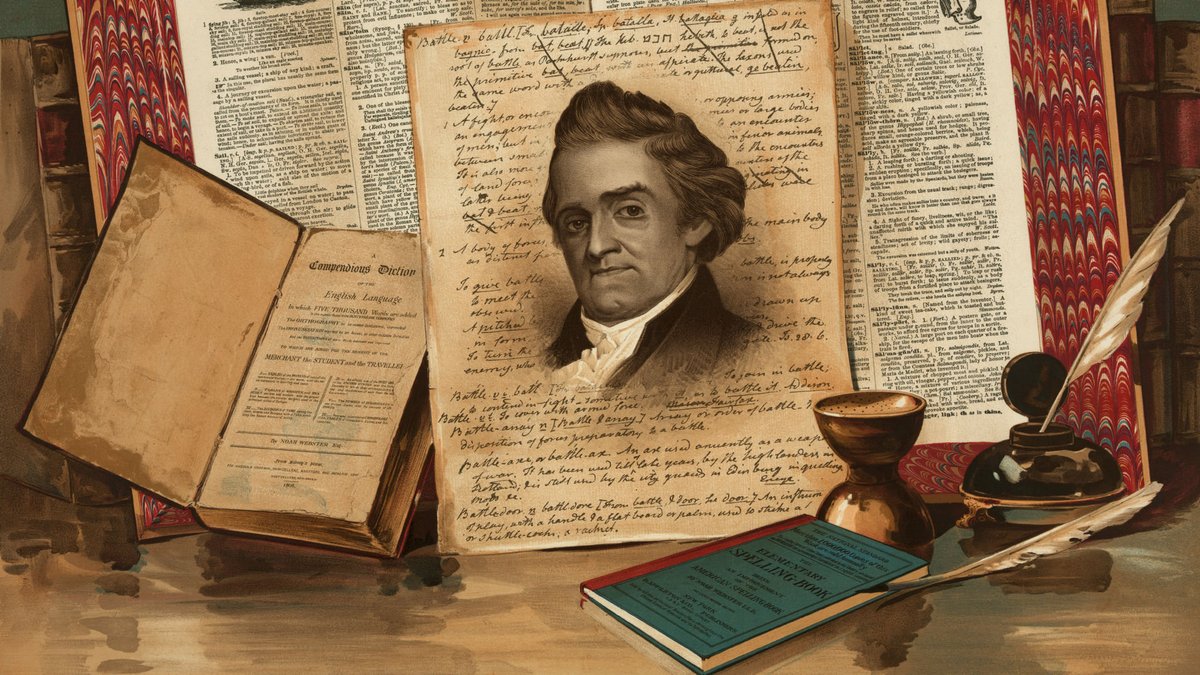Noah Webster's American Dictionary of the English Language
On this day in 1828, 195 years ago, the 1st edition of Noah Webster's "American Dictionary of the English Language" was published. Enslavers, who banned antislavery books at the rate antiracist books are banned today, objected to Webster’s definition of "slave."

Ibram X. Kendi
Partner • #GirlDad • Scholar @BU_Tweets • Dir @AntiracismCtr • @NationalBook Award Winner • #1 NYT Bestselling Author • MacArthur Fellow • Surviving Cancer 🐍

-
On this day in 1828, 195 years ago, the 1st edition of Noah Webster's "American Dictionary of the English Language" was published. Enslavers, who banned antislavery books at the rate antiracist books are banned today, objected to Webster’s definition of "slave." A 🧵 1/ pic.twitter.com/MAh76hXxB4
— Ibram X. Kendi (@DrIbram) April 14, 2023 -
While teaching in upstate New York in 1782, Webster became dissatisfied with the schoolbooks that ignored American culture. He set off on his life mission to create a uniquely American education, first with his ever-popular spelling book. 2/ pic.twitter.com/PNsPmWyDUz
— Ibram X. Kendi (@DrIbram) April 14, 2023 -
At 69, in 1828, Webster published "An American Dictionary of the English Language." Its 70,000 entries were split into two volumes. Webster died in 1843. George & Charles Merriam acquired the rights to Webster's dictionary, and in 1845, the @MerriamWebster Dictionary was born. 3/ pic.twitter.com/TCdpGq9eUZ
— Ibram X. Kendi (@DrIbram) April 14, 2023 -
Webster helped found the Connecticut Society for the Abolition of Slavery. Like many northerners, he ignored northern slavery, pushed gradual emancipation, and attacked abolitionists pushing immediate emancipation. “Preachers of abolitionism deserve the penitentiary,” he said. 4/ pic.twitter.com/vjNN4WQs6y
— Ibram X. Kendi (@DrIbram) April 14, 2023 -
So, Webster was not an abolitionist when he defined “slave” in his original 1828 dictionary as: "A person who is wholly subject to the will of another… a drudge, one who labors like a slave." This definition remained nearly the same in new editions over the next few decades. 5/ pic.twitter.com/xq7aVaHboC
— Ibram X. Kendi (@DrIbram) April 14, 2023 -
Edwin Heriot, a lawyer in Charleston, SC, likely made a living defending wealthy enslavers in court and in print. In 1856, he lambasted Webster’s definition of "slave" as part of an attack on "Anti-Slavery Text Books" in De Bow's Review, the Wall Street Journal for enslavers. 6/ pic.twitter.com/B3mOkpqvU9
— Ibram X. Kendi (@DrIbram) April 14, 2023 -
Heriot claimed “Anti-Slavery Text Books. . .are unsuitable and dangerous to Southern youth, and ought to be dispensed with.” So “we. . .have striven hard to induce parents and guardians and teachers to. . .admit the existence of the evil, and to apply the proper remedy.” 7/ pic.twitter.com/IHPdKkXN27
— Ibram X. Kendi (@DrIbram) April 14, 2023 -
What was “the dangerous tendency of anti-slavery text books”? They were “scandalous" in all their "falsehoods"; they misrepresented slavery and Black suffering, defamed southern institutions, and contested the truth of White superiority and Black inferiority, Heriot argued. 8/ pic.twitter.com/1dyBDpfk8i
— Ibram X. Kendi (@DrIbram) April 14, 2023 -
Anti-slavery authors "have made large fortunes,” Heriot wrote. “Webster’s Dictionary has run a career of prosperity to the tune of some $200,000." Heriot tried to discredit anti-slavery authors as "grifters,” the term and framing used today to discredit antiracist authors. 9/ pic.twitter.com/X0lZ7XG1gj
— Ibram X. Kendi (@DrIbram) April 14, 2023 -
In critiquing Webster’s definition, Heriot asserted that elite southern enslavers have been “wrongfully accused” of “nine-tenths of the cruelties to slaves.” Of the remaining one-tenth of actual cruelties, Heriot blamed the “low white man,” the non-enslaving White people. 10/ pic.twitter.com/LVBxY0z9UD
— Ibram X. Kendi (@DrIbram) April 14, 2023 -
Heriot cast “low” White people as “unfeeling scoundrels.” Back then, White elites were in denial and doing as many do today: attributing racism to “low” White people. Back then, defenders of slavery were creating many of today’s arguments for banning antiracist books. 11/11 pic.twitter.com/pWBLSArMvc
— Ibram X. Kendi (@DrIbram) April 14, 2023
